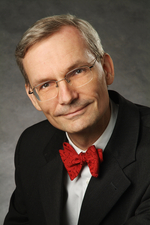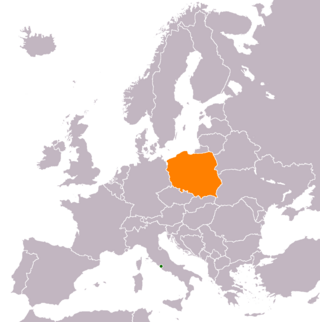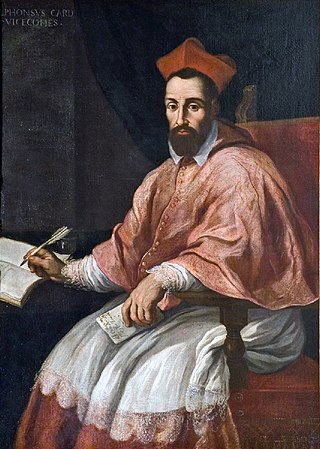
The Apostolic Nunciature to the United States, sometimes referred to as the Vatican Embassy, is the diplomatic mission of the Holy See to the United States. It is located at 3339 Massachusetts Avenue, Northwest, Washington, D.C., in the Embassy Row neighborhood. Since 2016, the papal nuncio has been Cardinal Christophe Pierre.

Bartolomeo Pacca was an Italian cardinal, scholar, and statesman as Cardinal Secretary of State. Pacca served as apostolic nuncio to Cologne, and later to Lisbon.

Michael F. Feldkamp is a German historian and journalist.

Anton Victor, Viceroy of Lombardy–Venetia was an Archduke of Austria and a Grand Master of the Teutonic Knights. He was also briefly the last Archbishop and Elector of Cologne and Prince-Bishop of Münster before those territories were secularised in 1803.

The Apostolic Nunciature to Germany is an ecclesiastical office of the Roman Catholic Church in Germany. It is a diplomatic post of the Holy See, whose representative is called the Apostolic Nuncio to Germany with the rank of an ambassador. The office of the nunciature has been located in Berlin since 1925, in union with the new Apostolic Nuncio to Prussia until 1934. Between 1920 and 1925 the nunciature was held in personal union by the Apostolic Nuncio to Bavaria, seated in Munich. With the unconditional surrender of Germany in 1945 the diplomatic ties were interrupted and reestablished for West Germany only in 1951, then in Bonn. In 2001 the nunciature moved again to Berlin.
The Congress of Ems was a meeting set up by the four prince-archbishops of the Holy Roman Empire, and held in August 1786 at Bad Ems in the Electorate of Trier. Its object was to protest against papal interference in the exercise of episcopal powers, and to fix the future relations between the participating archbishops and the pope. Representatives of the three elector-archbishops: Friedrich Karl von Erthal of Mainz, Maximilian Franz of Cologne, Clemens Wenceslaus of Trier, as well as of Prince-Archbishop Hieronymus von Colloredo of Salzburg took part.

The Apostolic Nuncio to Poland is one of the oldest nuncios, appointed by the Pope as apostolic representative to the Roman Catholic Church in Poland. Three nuncios to Poland went on to be elected pope. Three were cardinals at the time of their appointment as nuncio, and the rest—with the sole exception of Filippo Cortesi—were elevated afterwards.

Holy See–Poland relations are foreign relations between the Holy See and the Republic of Poland. As of 2015, approximately 92.9 percent of Poles belong to the Catholic Church.
The Apostolic Nunciature to Bavaria was an ecclesiastical office of the Roman Catholic Church in Bavaria. It was a diplomatic post of the Holy See, whose representative was called the Apostolic Nuncio to Bavaria, a state – consecutively during the nunciature's existence – of the Holy Roman Empire, of its own sovereignty, and then of Imperial, Weimar and finally Nazi Germany. The office of the nunciature was located in Munich from 1785 to 1936. Prior to this, there was one nunciature in the Holy Roman Empire, which was the nunciature in Cologne, accredited to the Archbishop-Electorates of Cologne, Mainz and Trier.
Ottavio Mirto Frangipani was an Italian bishop and papal diplomat, who as papal nuncio to Cologne (1587–1596) and to Brussels (1596–1606) oversaw the implementation of Tridentine reforms in the Rhineland and the Spanish Netherlands after the disruptions of the sixteenth century.
Ranuccio Scotti Douglas or Ranuzio Scotti Douglas was a Roman Catholic prelate who served as Bishop of Borgo San Donnino (1627–1650), Apostolic Nuncio to Switzerland (1630-1639), and Apostolic Nuncio to France (1639–1641).
Francesco Boccapaduli was a Roman Catholic prelate who served as Titular Archbishop of Athenae (1675–1680), Apostolic Nuncio to Venice (1652–1654), Apostolic Nuncio to Switzerland (1647–1652), Bishop of Città di Castello (1647–1672), and Bishop of Valva e Sulmona (1638–1647).
Francesco Gaetano or Francesco Caetani was a Roman Catholic prelate who served as Titular Archbishop of Rhodus (1652–1670) and Apostolic Nuncio to Spain (1652–1654).
Alberto Vassallo di Torregrossa was an Italian prelate and church diplomat. He was the last papal nuncio to Munich.
Cesare Speciano or Cesare Speciani (1539–1607) was a Roman Catholic prelate who served as Apostolic Nuncio to Emperor (1592–1597), Bishop of Cremona (1591–1607), Apostolic Nuncio to Spain (1585–1588), and Bishop of Novara (1584–1591).

Alfonso Visconti was an Italian Roman Catholic cardinal and diplomat.
Martino Alfieri or Alferi was Apostolic Nuncio to Cologne from 1634 to 1639 and he served also as Bishop of Isola and Archbishop of Cosenza.
Pierluigi Sartorelli was an Italian prelate of the Catholic Church who worked in the diplomatic service of the Holy See.

Giuseppe Laterza is an Italian prelate of the Catholic Church who works in the diplomatic service of the Holy See.
Giovanni Francesco Bonomi was a Roman Catholic prelate who served as Bishop of Vercelli, and Apostolic Nuncio to Switzerland, Apostolic Nuncio to Emperor and Apostolic Nuncio to Cologne. He was an exponent of the Catholic Reformation.










